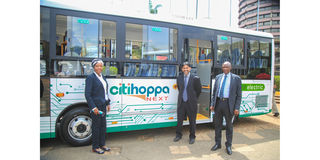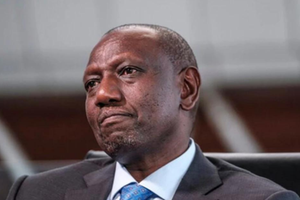BasiGo nets Sh806m for Kenya electric buses

Citi Hoppa MD Judy Thuo (left) with Jit Bhattacharya (CEO BasiGo) and Dr Joseph Njoroge, the principal secretary in the Ministry of Transport and Infrastructure, during the unveiling of the first electric buses for passenger use in Kenya.
Kenyan start-up BasiGo has secured about Sh806 million in fresh funding to drive the production of electric buses.
The start-up said it had received $6.6million (Sh805.5million) in funding from a team led by Mobility54, which is the corporate venture capital arm of Toyota Tsusho, Trucks VC — a transportation-focused venture capital (VC) fund in Silicon Valley, and Novastar Ventures — a global VC supporting entrepreneurs transforming markets in Africa.
This round of finance raises the total amount BasiGo has secured in 2022 to more than Sh1.3 billion($10.9 million).
The company said the funding would enable it to begin commercial delivery of locally manufactured electric buses and charging infrastructure through its pay-as-you-drive financing model.
“BasiGo is thrilled to have the backing of investors who are leaders in the automotive sector and climate finance,” said BasiGo CEO, Jit Bhattacharya.
The company said it has so far driven more than 110,000 kilometres and carried over 140,000 passengers in Nairobi with two buses it piloted in the capital city, through Citi Hoppa and East Shuttle.
The company said it has already received 100 reservations from customers, and recently entered into partnerships with KCB Group and Family Bank to provide up to 90 percent financing for the purchase of electric buses.
“We strongly believe in the potential of electric buses in Africa,” said Takeshi Watanabe, chief executive at Mobility54.
The companies identified high upfront costs as the greatest barrier to the adoption of electric buses in emerging markets.
The company wants to allow buyers to purchase an electric bus for a similar upfront cost as a diesel bus, and pay a Sh20 per kilometre subscription fee, which includes leasing the e-bus battery, charging at BasiGo charging stations, and comprehensive service and maintenance.
The company said it would deliver the next 15 electric buses in January as it enters operation with the majority of Nairobi’s largest bus operators.





